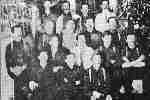
|
Ukrainian Canadian internees in Fort Henry, near Kingston, Christmas-time 1916 (Photo courtesy of N. Sakaliuk) |
OTTAWA -- It has been a long and unhappy wait, but a federal government has finally suggested a replacement for the War Measures Act, that legislative dinosaur from the First World War that has twice trampled civil liberties in Canada.
The replacement legislation, introduced by Defence Minister Perrin Beatty, got a trifle lost in the end-of-session scramble. But when parliamentarians return this fall, they'll find an impressive draft bill to chew over.
In retrospect, it's a pity Canada didn't possess such a bill when federal governments interned Japanese-Canadians during the Second World War and stomped on civil liberties during the "apprehended insurrection" in Quebec in 1970. During the October Crisis of that year, Liberal Justice Minister John Turner lamented that he had to use so blunt an instrument as the War Measures Act. He recognized that something more precise was required. So did Prime Minister Pierre Trudeau, but nothing ever appeared.
Mr. Beatty's bill sets out four classes of emergencies, ranging from public welfare emergencies (such as natural disasters) to a state of war. The class likely to attract most debate, however, is the one called "public order emergency." It's the class that most probably fits what happened in 1970.
The declaration of a public order emergency, authorized by Parliament within seven days, would give the government sweeping powers. It could regulate or prohibit public assemblies, travel and the use of specified property. It could impose fines after summary convictions, assume control of public utilities and services, and direct the maintenance of "essential public services." Critics already believe these words could justify government intervention in a national postal strike or some other form of labor dispute, although the criticism stretches the bounds of the imagination.
There is sure to be legitimate debate about the scope of these powers and about the definition of public order emergencies as incidents that offer "threats to the security of Canada." Maybe the wording can be fine-tuned, but, regrettably, any government in a democratic society needs these sorts of powers in genuine emergencies.
The trick lies in circumscribing those powers, and this is where the new bill provides a vast improvement. For starters, the bill would not take precedence over the Charter of Rights and Freedoms and the Bill of Rights. Parliament would be consulted throughout, and the state of emergency would be limited in time and place. Those whose liberties -- or property -- were harmed would be given the right to compensation.
The only worry here is that a section of the bill provides a long list of regulations under which the cabinet could define the ambit of compensation. A mean-spirited government, or one intent on post facto justifications for its actions, could make compensation unnecessarily limited by restrictive regulations. Fortunately, a Federal Court judge would hear appeals from ministerial decisions, though he could not unilaterally increase the monetary compensation offered by the government. Even with the Federal Court appeal, the government has set itself up too much as judge and jury over compensation awards.
These are the kinds of issues a Commons committee should work on this fall. But the quibbles should not obscure the basic soundness of the government's approach.
After decades of delay and years of broken promises, a government has made a genuine effort to update the War Measures Act, trying to find the fine line between a society's right to be protected in times of emergencies and the individual's right to be protected from arbitrary governmental power. The government deserves a pat on the back.
![]() Return to Righting An Injustice Page
Return to Righting An Injustice Page
![]() Return to Internment of Ukrainians in Canada 1914-1920 Page
Return to Internment of Ukrainians in Canada 1914-1920 Page
![]() Return to Ukrainian History Page
Return to Ukrainian History Page
![]() Return to InfoUkes Home Page
Return to InfoUkes Home Page
Document URL: http://www.infoukes.com/history/internment/booklet02/doc-005.html
Copyright © 1994 Ukrainian Canadian Civil Liberties Association
Copyright © 1994 Lubomyr Luciuk
We acknowledge the help in the preparation of this document by Amanda Anderson
Page layout, design, integration, and maintenance by G.W. Kokodyniak and V. Pawlowsky
Copyright © 1996-1997 InfoUkes Inc.
E-mail: internment@infoukes.com
|
since Mar 1 1997 |
InfoUkes Inc. Suite 185, 3044 Bloor Street West Etobicoke, Ontario, Canada M8X 2Y8 Tel: (416) 236-4865 Fax: (416) 766-5704 |
Originally Composed: Saturday September 21st 1996.
Date last modified: Thursday October 30th 1997.